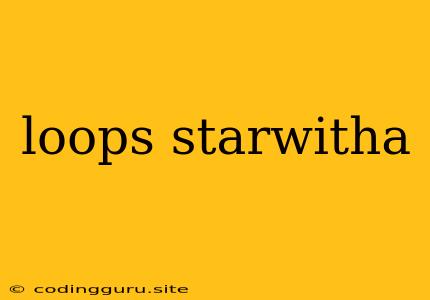Loops and Their Role in Programming: A Comprehensive Guide
Loops are fundamental building blocks in any programming language, enabling you to automate repetitive tasks efficiently. They allow you to execute a block of code multiple times, saving you from writing the same code over and over again.
Why are loops so important?
Imagine you need to print the numbers from 1 to 100. Would you write a line of code for each number? That would be tedious and prone to errors. Loops provide a streamlined solution, allowing you to achieve this with just a few lines of code.
Types of Loops
There are different types of loops, each serving a specific purpose:
1. for Loop
The for loop is the most commonly used loop type. It's perfect when you know exactly how many times you want to iterate.
Example (Python):
for i in range(1, 11):
print(i)
This code will print the numbers 1 to 10.
2. while Loop
The while loop executes a block of code as long as a specific condition is true. This is useful when you don't know the exact number of iterations in advance.
Example (Python):
i = 1
while i <= 10:
print(i)
i += 1
This code also prints numbers 1 to 10.
3. do-while Loop
The do-while loop is similar to the while loop, but it guarantees the code block will execute at least once before checking the condition. This is useful when you want to ensure a minimum execution of the loop.
Example (Java):
int i = 1;
do {
System.out.println(i);
i++;
} while (i <= 10);
This code also prints numbers 1 to 10.
4. foreach Loop
The foreach loop is a convenient way to iterate through elements in a collection (like an array or list).
Example (C#):
int[] numbers = {1, 2, 3, 4, 5};
foreach (int number in numbers) {
Console.WriteLine(number);
}
This code prints each element in the numbers array.
Best Practices for Looping
- Clear and Concise Code: Ensure your loop logic is easy to understand and follow.
- Correct Termination Condition: Always have a condition that will eventually stop the loop, preventing infinite loops.
- Data Structure Choice: Choose the appropriate data structure for your loop, considering factors like whether you know the number of iterations in advance.
- Code Optimization: Minimize the number of operations inside the loop for improved performance.
Conclusion
Loops are powerful tools in programming that simplify code and make it more efficient. By mastering different loop types and implementing best practices, you can streamline your code and enhance your programming skills. Understanding loops is a crucial step towards becoming a proficient programmer.
